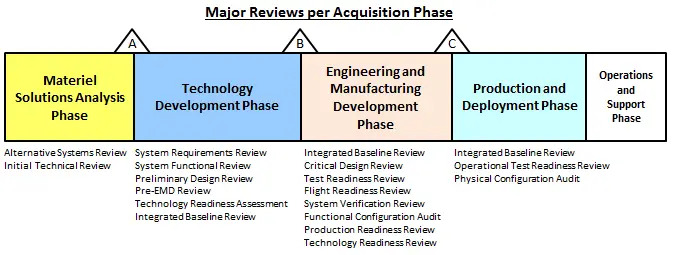
A Major Program Review is a time-based event where all key stakeholders on an acquisition program gather to discuss the progress of their program. Usually, the review decides if there is sufficient data to suggest that a program can proceed to the next phase of the program. There are two main categories of reviews that take place during the life cycle of an acquisition program. These are:
- Program
- Technical
Program Reviews
Program Reviews are a fundamental part of an acquisition program that focuses on cost, schedule, and performance. They’re an important oversight tool that the Program Manager (PM) and key Stakeholders can use to review and evaluate the state of the program, re-directing activity if necessary. The majority of program reviews focus on determining if a program has achieved its objectives to date and will be allowed to proceed into the next acquisition phase.
The main program reviews during an acquisition program are:
Technical Reviews
Technical Reviews are a fundamental part of the Systems Engineering Technical Assessment Process for the PM. They’re an important oversight tool that the PM can use to review and evaluate the state of the system and the program, re-directing activity if necessary. They examine if a program is achieving its technical objectives as detailed in the acquisition strategy. Technical reviews can include an assessment of systems engineering, software, risk management, requirements, technology readiness & development, and the technical baseline. The top technical reviews are:
Alternative Systems Review (ASR)
The ASR is a technical review completed prior to Milestone-A which assesses the preliminary materiel solutions that have been developed during the Materiel Solution Analysis (MSA) phase. The review examines each proposed materiel solution(s) to see which one has the best potential to be cost-effective, affordable, operationally effective, and suitable, and can be developed in a timely manner with an acceptable level of risk. The information obtained from the ASR is used in the Milestone-A review to determine if the solutions(s) under review can proceed into the Technology Maturation & Risk Reduction (TD) Phase.
System Requirements Review (SRR)
The SRR is a technical review conducted during the Technology Maturation & Risk Reduction (TD) Phase to determine the progress a program has made in defining system-level requirements. This review determines the progress of the systems engineering effort and if the effort is on track with meeting the capability needs defining in the Initial Capabilities Document (ICD). The SRR is used during the Milestone-B review to determine if a program can process into the Engineering, Manufacturing, and Development (EMD) Phase.
Preliminary Design Review (PDR)
The PDR is a technical review conducted during the Technology Maturation & Risk Reduction (TD) Phase to determine if a system is ready to proceed into a detailed design. It determines if the current preliminary system design meets the stated performance requirements within cost, schedule, and risk. It also ensures that each function in the functional baseline has been allocated to one or more system configuration items.
Critical Design Review (CDR)
The CDR is a technical review conducted during the Engineering, Manufacturing and Development (EMD) Phase to determine if a system can proceed into fabrication, demonstration, and test and can meet the stated performance requirements within cost, schedule, and risk. This review assesses the system’s final design for each configuration item in the system’s product baseline to ensure it has been captured in the detailed design documentation.
Production Readiness Review (PRR)
The PRR review examines a program to determine if the design is ready for production. It determined if the prime contractor and subcontractors have accomplished production planning without incurring unacceptable levels of risks that will breach thresholds of schedule, performance, and cost. The review evaluates the production-configured system to determine if it meets all system requirements and that those requirements are traceability to the final production system.
Other commonly used technical reviews during most acquisition programs are:
- Initial Technical Review
- Alternative Systems Review
- System Requirements Review
- Technology Readiness Assessment
- Integrated Baseline Review
- System Functional Review
- Preliminary Design Review
- Pre-Engineering, Manufacturing & Development (EMD) Review
- Critical Design Review
- Test Readiness Review
- Flight Readiness Review
- System Verification Review
- Functional Configuration Audit
- Production Readiness Review
- Operational Test Readiness Review
- Physical Configuration Audit
- In-Service Review
AcqLinks and References:
- Defense Acquisition Guidebook (DAG) – Chapter 5
- NAVAIR Instruction 4355.19D – Systems Engineering Technical Review
Updated: 7/25/2021
Rank: G1
